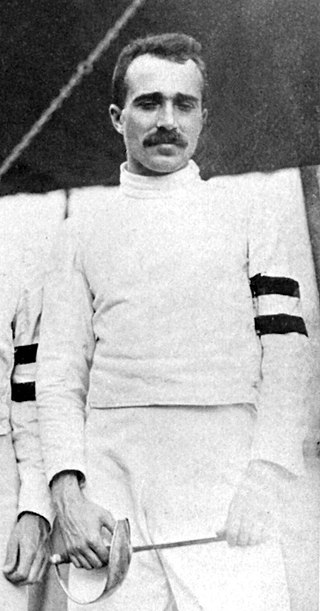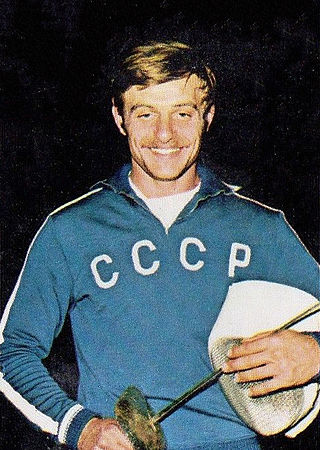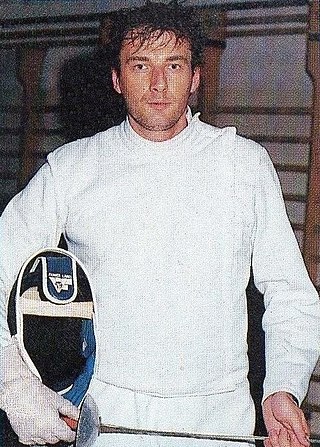
János Garay was a Jewish Hungarian fencer, and one of the best sabre fencers in the world in the 1920s. Gaining international recognition in Olympic sabre competition, he distinguished himself winning a gold medal in 1928 in Amsterdam, and a silver and bronze medal in 1924 in Paris.

Claude Netter was a French Olympic champion foil fencer.
Jacques Lefèvre was a French fencer. At the 1952 Summer Olympics, Lefèvre won a team bronze medal for fencing, as a member of the French Men's Sabre team. He competed for France in the individual and team sabre events at each Summer Olympics from 1948 to 1964. He also competed at the Mediterranean Games in 1951, where he won a gold medal in the individual sabre event and a bronze medal in the team sabre event, and in 1955, where he won a gold medal in the individual sabre event and a silver medal in the team event. Lefèvre died in La Rochelle on 12 January 2024, at the age of 95.

Aldo Montano III is an Italian fencer and a five-time Olympic medalist.

Dr. Péter Tóth was a Hungarian fencer who competed at the 1906 Intercalated Games and the 1908, 1912 and 1928 Olympics. He won team gold medals in sabre in 1908 and 1912, finishing fifth-sixth individually; he won an individual bronze medal in the sabre three hits event in 1906. In 1928, he placed fifth in the team foil. Domestically, Tóth won 17 Hungarian foil and sabre titles between 1907 and 1934 and competed until 1937.
Jean Levavasseur was a French fencer. He won a bronze medal in the team sabre event at the 1952 Summer Olympics.
Gastone Darè was an Italian fencer and politician. He won two silver medals in the team sabre events at the 1948 and 1952 Summer Olympics. He also competed at the 1955 Mediterranean Games where he won a gold medal in the team sabre event and a bronze medal in the individual sabre event. He was elected to the Italian Senate for the Socialist Party in 1963 and 1968.
Mauro Racca was an Italian fencer. He won two silver medals in the team sabre events at the 1948 and 1952 Summer Olympics. He also competed at the 1951 Mediterranean Games where he won a gold medal in the team sabre event and a silver medal in the individual sabre event.
Jacques Roulot was a French fencer. He competed in the individual and team sabre events at the 1956 and 1960 Summer Olympics. He also competed at the Mediterranean Games in 1955, where he won a silver medal in the team sabre event, and in 1959, where he won a gold medal in the team sabre event and a silver medal in the individual sabre event.
Arnold Ralph Cooperman was a British three-time Olympic foil and sabre fencer.
Michael John Amberg was a British fencer. He competed in the individual and team sabre events at the 1960 Summer Olympics.
Jean-Ernest Ramez was a French fencer. He competed in the team sabre events at the 1964 and 1968 Summer Olympics.
Robert Fraisse was a French fencer. He competed in the team sabre event at the 1964 Summer Olympics. He also competed at the 1959 Mediterranean Games where he won a gold medal in the team sabre event and a bronze medal in the individual sabre event.
Péter Bakonyi (Buchwald) is a Hungarian Olympic sabre fencer. He won two Olympic bronze medals, and one World Championship gold medal.

Rolando Rigoli is a retired Italian fencer. He competed at the 1968 and 1972 Olympics in the individual and team sabre events and won a silver and a gold team medal, respectively. He also competed at the 1971 Mediterranean Games where he won a gold medal in the individual sabre event.

The men's sabre was one of eight fencing events on the fencing at the 1972 Summer Olympics programme. It was the seventeenth appearance of the event. The competition was held from 30 to 31 August 1972. 53 fencers from 22 nations competed. Nations had been limited to three fencers each since 1928. The event was won by Viktor Sidyak of the Soviet Union, the nation's first victory in the event. Hungary had lost its nine-Games gold medal streak in 1968 but remained a power in the event; Péter Marót took silver to extend Hungary's podium streak to 11 Games. Another Soviet, Vladimir Nazlymov, earned bronze.

The men's sabre was one of eight fencing events on the fencing at the 1976 Summer Olympics programme. It was the eighteenth appearance of the event. The competition was held from 21 to 22 July 1976. 46 fencers from 18 nations competed. Nations had been limited to three fencers each since 1928. The event was won by Viktor Krovopuskov of the Soviet Union, the nation's second consecutive victory in the men's sabre. The Soviet Union's two gold medals in the event moved it out of a six-way tie into sole possession of second place all-time, after Hungary with 11. The Soviet team swept the men's sabre medals in 1976, with Vladimir Nazlymov taking silver and Viktor Sidyak bronze. It was the third sweep in the event. Nazlymov and Sidyak were the eighth and ninth men to win multiple medals in the event. Excluding matches against each other, the three Soviets went 48–3 during the tournament. For the first time since 1900, Hungary competed in the men's sabre but did not win a medal.

The men's sabre was one of eight fencing events on the fencing at the 1980 Summer Olympics programme. It was the nineteenth appearance of the event. The competition was held from 24 to 25 July 1980. 30 fencers from 12 nations competed. Nations had been limited to three fencers each since 1928. The event was won by defending champion Viktor Krovopuskov of the Soviet Union, the nation's third consecutive victory in the event. Krovopuskov was the third man to successfully defend a sabre title and the 10th man to win two medals of any color in the event. His teammate Mikhail Burtsev took silver. Imre Gedővári's bronze medal returned Hungary to the podium after a one-Games absence broke an eleven-Games streak.
Ferdinando Meglio is an Italian fencer. In the team sabre events he won a gold medal at the 1984 Summer Olympics, a silver at the 1980 Summer Olympics and a bronze at the 1988 Summer Olympics. He also competed in the individual sabre event at the Mediterranean Games winning gold medals in 1983 and 1991.

The men's sabre was one of eight fencing events on the fencing at the 1984 Summer Olympics programme. It was the twentieth appearance of the event. The competition was held from 3 to 4 August 1984. 33 fencers from 16 nations competed. Nations had been limited to three fencers each since 1928. The event was won by Jean-François Lamour of France, the nation's first victory in the event since 1900. Marco Marin of Italy took silver and Peter Westbrook of the United States took bronze. It was the first medal in the event in many Games for each of the three nations since 1964 for France, since 1960 for Italy, and since 1904 for the United States), as the men's sabre competitions had been dominated by Hungary and the Soviet Union. With both of those nations boycotting the 1984 Games, other nations had an opportunity to win medals in the sabre.








